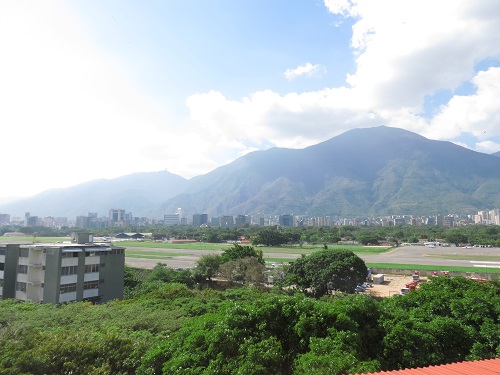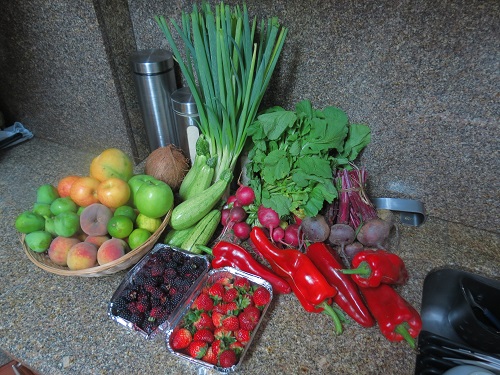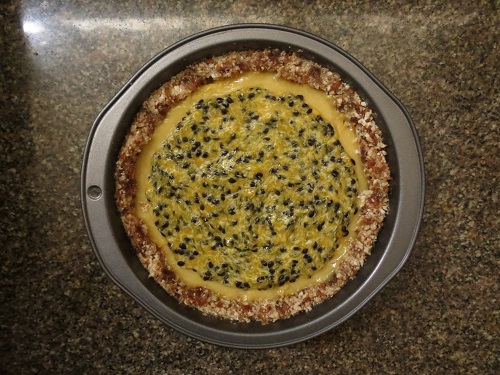I first heard from today's guest poster, Gabriel, when I asked for perspective from men for our Plant-Based Guys series. English is not Gabriel's first (or second!) language, but he shared somuch fascinating information about his experience being plant-based/vegan in Venezuela that I asked him to guest post!
As you know, I lived on a small island in the Caribbean for a year (where I wrote EHH!) as well as several small towns/rural areas in the United States, where my access to food (in general) was very limited and my access to "vegan" foods like fake meat was totally non-existant.
In all my travels I've always been able to keep vegan — and plant-based! Admittedly, I haven't always had the most exciting option (rice and fruit has happened more than once!) but I always find something to eat — and something healthy at that.
Point is, with a little persistance and creativity, you can make a plant-based diet work pretty much anywhere.
I've also found I eat the healthiest (I guess by default!) when I'm living in places where I couldn't really eat out, and I didn't have access to "vegan" substitutes. Really puts the squeeze on to keep it healthy and whole!
I can't stress this enough: you don't need certain foods to be vegan or plant-based. You only need access to fruits, vegetables, grains and legumes, which are everywhere :) You could even do it with just vegetables and fruits and a starch :)
I hope today's guest post inspires you!

HH: How long have you followed a plant-based/vegan diet?
I've been a vegan for one year, seven months and two weeks. I have always been vegan at home, but the first 6 months it was difficult to eat vegan outside my kitchen [as I was learning]. I often picked vegetarian choices it was simply because I wasn't prepared. Now I always have food with me when I go outside.
HH: What were your motivations?
I love animals. Since I can remember, I've always been very uncomfortable with people hurting them for recreation (something common in some rural parts in Venezuela) or for consumption. My family only follows what they learned from their parents. They didn't know anything about vegetarianism or veganism — neither did I, so I just temporarily accepted the "fact" that I had to eat them even though I didn't want to. When I was 15, I became VERY uncomfortable with eating them, but I didn't know anything about nutrition. I was still in high school and my English wasn't very good. Information in Spanish about such diets was very limited, particularly in my country, although that has changed in the last few years and is still improving quickly. Since everybody was telling me I couldn't stop eating meat or else I'd become stupid, anemic, etc., I believed it. My world was very narrow.
When I made the decision to first inform myself about nutrition (the first book I read on the subject was Vegan For Life), I realized I didn't need to eat animals to be alive. Everyone was wrong and I could do something I've always wanted to do. I felt like I got something back when I became vegan. Does that make sense? Like somewhere along the way I lost something and when I decided to stop eating animals and contributing to their unnecessary suffering, I got it back.
HH: Where do you/did you get your information?
Most of the information I get about this lifestyle is from North American sources. Most of the cookbooks I have, websites I follow, nutritional books, etc., are from your country. English is the main language in which I can most accurately inform myself about anything related to a healthy vegan lifestyle.
HH: So what's the plant-based experience like in Venezuela?
In most South American countries, vegan products [Editorial note: i.e. fake meats, etc.] are limited. Notable exceptions are Colombia, Brazil and Argentina.
For example, tofu can be found only on Sundays at the only Chinese market in Caracas. You can also get sweetened or unsweetened soy milk, all made by the Chinese. [I have regular access to] imported milks like soy, almond and rice, but they are very expensive and it's easier and possibly better to make it your own.
But more than that, those countries [Colombia, Brazil and Argentina] have a variety of whole foods that my country seems to be completely unaware of. We have several options, but not as many as other countries.
HH: You mentioned you make your own "milk." Do you make anything else yourself? (Editorial note: You can find my recipe for making rice milk here).
I also make my own tofu because the Chinese only make the soft type. If you make your own, you can make sure you get the texture and firmness you need.
I also learned how to make date syrup to use as natural sweetener.
Things we have in abundance:Coconuts, bananas, passion fruits, yucca, pineapples, eggplants, tomatoes, potatoes, onions, green onions, aloe, carrots, ginger, avocado, almonds, walnuts, grapes, bell peppers, chilis, button mushrooms and portobellos, flaxseed, green leafy vegetables, whole oats, barley, wheat, sesame seeds, peanuts, all spices. Amaranth grows naturally all over the city and you can take as much as you want; the grains, the leaves, anything. Quinoa is imported from travelling merchants from Peru and Bolivia, so it's pretty cheap. Dates are cheap, but they are not easily available. Raisins are in every freaking store, but I don't like them. Apples are mostly imported from Chile and they are quite expensive, but the red ones are delicious.
In Margarita, you can get frozen, organic fruits that are hard or impossible to get in the rest of the country, like blueberries. I LOVE blueberries, which I ate every single day the only 10 days I spent in the U.S. We can get frozen bags of edamame beans and vegetable dumplings.
To buy everything, you mostly have to go through several stores at different days and times. It's like a treasure hunt, which you are not always in the mood for. To get foods like okra, daikon, turnips, radishes, grapefruits, Dragon fruits, you must do this.
HH: You've listed several whole foods that aren't available to us in the U.S. (I'm curious now!) and I imagine there are also fruits, vegetables, etc. that are native to your region?
We have several native fruits that maybe you have never heard about, which are very delicious and nutritious. We have different varieties of passion fruits and tomatoes, squash, several fruits that I can't name in English. One of my favourite fruits is the Soursop. Oh, Mangoes! They grow in so many trees all over the country. You can get as many as you want all the time. Cacao is also very cheap, since Venezuela is famous for it's several quality cacao breeds and plantations. Coffee is world's seconds best. Colombian coffee is the best in the world, simply the most delicious ever.
We have many other foods that are not available in the U.S., like coca leaves. These are delicious and have a very high nutritional profile, but since they are the raw material to make cocaine, it has many misconceptions and is banned in your country as well as Europe, I think. It's a shame, though. Coca leaves have been part of the South American culture, especially the Andean culture and the Incas for hundreds of years, and rightly so. You can chew them raw or make tea with them. If you ever travel to South America, please try to find them. You will feel the natural boost that they give instantly!
HH: When I was working on Happy Herbivore Abroad, I discovered a lot of cultures have traditional recipes that are vegan or vegetarian by nature. Anything like that in Venezuelan cuisine?
Venezuela has a few traditional vegan recipes. The most important one being the Arepa, which is a traditional flatbread made with yellow cornmeal or white cornmeal. Cachapas are corn pancakes that are very delicious and usually served with traditional Venezuelan cheese. Guasacaca is a not so known Venezuelan sauce that you have to try! It's similar to Mexican Guacamole in appearance and it shares some ingredients, but it tastes different! We have vegetarian dishes that I turn into vegan like Chicha, a rice- and milk-based beverage, although a Chicha in Peru and nearby countries is a corn-based fermented beverage, very delicious too!
I like to cook all the time, and because of everything I've told you, I have to make my own versions of pretty much everything. Milks, sprouts, tofu, flours... This lifestyle gave me this! I didn't know how to boil water before I stopped eating animals. Now, I can make delicious things like coconut tomato soup with avocado croutons and spinach. I didn't even know what spinach tasted like a year and seven months ago! I didn't even know that amaranth grew everywhere in this city and that you could eat it, and for free!
HH: You had an interesting experience (and observation) when visiting to the U.S., tell us about that.
In my country, most of our vegetables are available only when they are in season, so their nutritional value and taste is always optimal.
Here, a simple lettuce is very flavourful. There, when I dined at restaurants with my family [in the United States], most vegetables tasted like water. They had no flavour at all. I enjoyed blueberries so much because they were in season when I was there.
HH: Although you live in Caracas now, you grew up in the Amazon. What was your diet like there?
I was born and raised in the Amazon, and my diet was mostly root vegetables, fruits and nuts, but we had fish, turtle, chicken, insects and arachnids.
HH: What are social situations like? Are family and friends supportive?
Barbecue parties are incredibly popular and common here in Venezuela. I always take these almond and flaxseed patties from Brendan Brazier's Thrive book, vegetables I can put in a stick and grill, as well as a huge bowl of salad to share and it immediately catches attention. Sometimes the guys who I don't know ask me to try the patties, particularly, and the usual comment is: "it's good, but it doesn't taste like meat", and I always reply something like "I know, I don't need it to" and they look at me as if they are trying to figure out a math problem. Here in my country, people don't generally understand why someone would avoid eating animals. They might get the impression that it must be healthy, but they first believe it must be because you are part of some weird religion. They also think that if you only eat vegetables, then you must try to make them taste like meat. If I tried to cook a dish that would try to emulate the taste of any animal meat, I'd only do so to give to my friends and relatives, not because I needed it. I never liked a lot of animal products, specially seafood. It tastes just like it smells to me: hideous. I used to like sushi so much but because I couldn't taste the raw fish. Now I make vegan sushi and it's even tastier to me.
When I say I love being vegan, It has nothing to do with what I eat. Sure, the food is delicious. It's beyond delicious sometimes. But it's what I don't eat what makes me happy! It's what I choose not to consume in any way what matters to me. When my friends say they love to eat "their" meat, they always made this grin where they close their eyes but not completely and press on their eyelids while they flicker their eyeballs, and then pat on their stomach. I's a very hormonal, almost completely animal response. I truly believe it's a gap in their thought process. I refuse to believe that humans can be naturally selfish and insensitive when it comes to animal suffering.
HH: The internet is amazing, in that it has brought you and I together to share your experiences. Have you been able to find other vegans in Venezuela, online or off?
We have a group on Facebook for vegetarians and vegans in Venezuela, and we are less than 400 hundred people. In reality, there must be less than 1,000 of us here. Venezuela has a population of almost 29 million people!
The other vegetarians/vegans I know are very aggressive. They always tell people what to eat, bombard social networking sites with pictures of animals being killed in slaughterhouses and things like that. They are too passionate and that's not the answer to make a significant change, especially in my country.
HH: Given this cultural identity to meat, did you have any concerns or worries about making the switch and how those you loved might react?
I was only worried about my father. You see, my father co-owns a dairy and meat food distributor. My fridge is always filled with beef, salmon, cod, serrano, chorizo, parmesan, mozzarella, anything you can imagine that comes from the body of an animal. But I didn't really have to; he accepted my choice right away and sometimes he jokes around with me, without being pedantic about it. Me and my friends have had many conversations about the health benefits of a plant-based diet and every time we hang out they treat me as if I'm this sort of health choice authority. Always asking me if they should eat this or that, or what's wrong with eating a certain product. One of my friends always becomes vegan whenever we hang out, he does this consciously and quite eagerly I have to say. I believe if he had more time and was more disciplined he would adopt the lifestyle himself almost completely. I do my homework so I always answer their questions and lead them to my sources, if possible.

HH: Any advice for someone new to or looking to fall into a plant-based/vegan diet? Particularly if they live in an area with limited options?
Know what your options are! Go slowly. Inform yourself but take your time to let the information sink in. Rome wasn't built in one day. You have to learn how to cook! Understand that this is difficult, scary and sometimes downright annoying, but it's also so damn fun and incredibly rewarding. If you put your heart into it and make an effort to always try new things and improve, you'll develop a skill that not only makes people feel more drawn to you, but also makes them happy and healthy. Every time I look for vegan recipes in books or online, I always get very refined, gourmet recipes. Vegan version of the classics seem to be the most carefully thought of, so definitely don't think that you'll be limited in your choices. Your world is about to expand for the better!
Thanks, Gabriel!



















